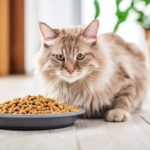Artichokes are a delicious and nutritious vegetable that many humans enjoy, but what about our feline friends? Can cats safely eat artichokes? In this comprehensive guide, we will explore the topic of cats and artichokes to provide you with all the information you need to make an informed decision about feeding this vegetable to your cat.
What You Need to Know About Artichokes
Artichokes, scientifically known as Cynara scolymus, are members of the thistle family. These vegetables are native to the Mediterranean region and are often cultivated for their edible flower buds. Artichokes are low in fat, high in fiber, and packed with essential nutrients such as phosphorus, folate, magnesium, and vitamin C.
While artichokes are safe for human consumption, it is important to understand that cats have different dietary needs. Cats are obligate carnivores, which means their bodies are designed to thrive on a diet primarily composed of meat. Unlike humans, cats have difficulty digesting plant material and may not derive enough nutrients from it.
Potential Risks of Feeding Artichokes to Cats
Although artichokes are not toxic to cats, there are several potential risks associated with feeding this vegetable to your feline companion. One of the main concerns is the potential for gastrointestinal distress. Cats may experience symptoms such as vomiting, diarrhea, and decreased appetite if they consume artichokes in large quantities.
It is important to note that cats should only consume small amounts of artichokes as an occasional treat. Feeding them as a regular part of their diet can lead to digestive upset and other health issues. Additionally, artichokes should always be cooked before offering them to your cat, as raw artichokes can be difficult for cats to digest.
Introducing Artichokes to Your Cat’s Diet
If you decide to offer your cat a small amount of cooked artichoke as a treat, there are a few important things to keep in mind. Firstly, ensure that the artichoke is thoroughly cooked and free from any seasonings, oils, or additives. Ingredients such as garlic and onions, often used in human cooking, can be toxic to cats.
It is also crucial to remove the outer portion of the artichoke, including the tough leaves and stem, as these parts can pose a choking hazard for cats. Only offer your cat the heart of the artichoke, in small, bite-sized pieces. Remember, moderation is key when it comes to feeding any new food to your cat.
Signs of Artichoke Poisoning in Cats
While artichokes are generally safe for cats in small amounts, it is important to be aware of the signs of artichoke poisoning. If your cat consumes a large quantity of artichoke or shows any unusual symptoms after eating this vegetable, it is essential to seek veterinary care immediately.
Symptoms of artichoke poisoning in cats may include vomiting, diarrhea, abdominal pain, decreased appetite, and lethargy. In severe cases, artichoke consumption can even lead to liver damage. It is always better to err on the side of caution and consult with a veterinarian if you have any concerns about your cat’s health.
Other Vegetables to Avoid
While artichokes may not be toxic to cats, there are several other vegetables that should be avoided altogether to ensure your cat’s safety. Some common vegetables that can be harmful to cats include onions, garlic, chives, leeks, and green tomatoes.
These vegetables contain compounds that can cause anemia, gastrointestinal upset, and even damage to the red blood cells in cats. It is crucial to keep these vegetables out of your cat’s reach and avoid feeding them to your feline companion.
Providing a Balanced Diet for Your Cat
As obligate carnivores, cats require a diet that is rich in animal protein to thrive. While small amounts of certain vegetables can be offered as occasional treats, they should not make up a significant portion of your cat’s diet. It is essential to provide your cat with a balanced and nutritionally complete cat food that meets all their dietary needs.
If you are concerned about meeting your cat’s nutritional requirements, consult with your veterinarian. They can provide guidance on choosing the right cat food and may recommend specific dietary supplements if necessary.
Safe Alternatives for Cats to Chew On
If you are looking for safe alternatives for your cat to chew on, there are several options that can satisfy their natural urge to nibble on greenery without posing any health risks. Catnip and cat grass are both safe and enjoyable for cats. These plants provide enrichment and can help promote healthy digestion.
Additionally, there are specific indoor and outdoor plants that are safe for cats to interact with. Spider plants, Boston ferns, and African violets are just a few examples of cat-friendly plants that can add a touch of greenery to your home while keeping your feline friend safe.
Creating a Cat-Safe Environment
To ensure your cat’s safety, it is important to create a cat-safe environment both indoors and outdoors. This includes keeping toxic plants out of your home and garden. Research any plant before bringing it into your home and make sure it is not harmful to cats.
If you have an outdoor space, consider fencing off certain areas or using a deterrent spray to keep your cat away from potentially dangerous plants. Providing your cat with plenty of safe, cat-friendly plants and toys can also help redirect their chewing behavior and keep them entertained.
Regular Veterinary Check-ups
Regular veterinary check-ups are essential for maintaining your cat’s overall health and well-being. During these visits, your veterinarian can assess your cat’s nutritional needs, monitor their weight, and address any concerns you may have about their diet or behavior.
If you have any questions or concerns about feeding artichokes or any other food to your cat, do not hesitate to consult with your veterinarian. They can provide personalized advice based on your cat’s individual needs and help ensure they are receiving a balanced diet.
Conclusion
While artichokes are not toxic to cats, they should only be fed in small amounts as an occasional treat. Cats have different dietary requirements than humans, and their bodies are designed to thrive on a primarily meat-based diet.
If you choose to offer your cat a taste of artichoke, make sure it is thoroughly cooked, free from any seasonings or additives, and given in moderation. Always monitor your cat for any signs of gastrointestinal distress or other adverse reactions.
Remember, providing a balanced and nutritionally complete cat food that meets all your cat’s dietary needs is crucial for their overall health. If you have any concerns about your cat’s diet or nutrition, consult with your veterinarian for personalized advice and guidance.






